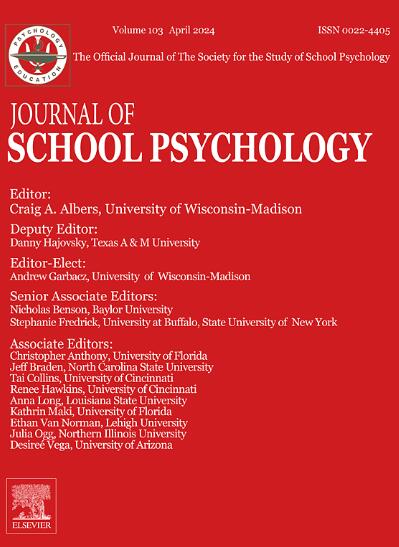超越自我照顾:为学校心理学课程开展一项气候调查
IF 4.1
1区 心理学
Q1 PSYCHOLOGY, SOCIAL
引用次数: 0
摘要
研究生课程氛围是培训、专业发展和未来学校心理学家身份的重要组成部分。理解项目氛围的挑战之一是如何衡量这样一个结构,以便项目能够促进学习和批判性思维的欢迎和转型空间。本研究旨在开发并初步验证研究生对学校心理学项目气候的感知和体验,即学校心理学中关系和公平的气候评估。通过对212名学校心理学研究生的探索性因子分析,我们发现了一个四因素结构:(a)项目动态和心理安全,(b)多样性、公平和包容,(c)同伴支持,(d)资源。在这些因素中,研究生对同伴支持的评价最高,对多样性、公平性和包容性的评价最低,这表明,在涉及社会正义问题时,继续需要项目提供机会和培训,以参与项目和个人责任。提供了研究生和教师倡导改善学校心理学研究生课程氛围的含义。本文章由计算机程序翻译,如有差异,请以英文原文为准。
Beyond self-care: Developing a climate survey for school psychology programs
Graduate program climates are an essential part of training, professional development, and identity for future school psychologists. One of the challenges of understanding program climate is how to measure such a construct so that programs can facilitate welcoming and transformational spaces for learning and critical thinking. This study aimed to develop and initially validate a measure of graduate students' perceptions and experiences of school psychology program climates, the Climate Assessment for Relationships and Equity in School Psychology. Results of an exploratory factor analysis from a sample of 212 school psychology graduate students revealed a four-factor structure: (a) program dynamics and psychological safety, (b) diversity, equity, and inclusion, (c) peer support, and (d) resources. Of these factors, graduate students rated peer support most favorably and diversity, equity, and inclusion as most lacking, indicating a continuing need for programs to provide opportunities and training to engage in program and individual accountability as they relate to social justice issues. Implications for graduate student and faculty advocacy to improve climate in school psychology graduate programs are provided.
求助全文
通过发布文献求助,成功后即可免费获取论文全文。
去求助
来源期刊

Journal of School Psychology
PSYCHOLOGY, EDUCATIONAL-
CiteScore
6.70
自引率
8.00%
发文量
71
期刊介绍:
The Journal of School Psychology publishes original empirical articles and critical reviews of the literature on research and practices relevant to psychological and behavioral processes in school settings. JSP presents research on intervention mechanisms and approaches; schooling effects on the development of social, cognitive, mental-health, and achievement-related outcomes; assessment; and consultation. Submissions from a variety of disciplines are encouraged. All manuscripts are read by the Editor and one or more editorial consultants with the intent of providing appropriate and constructive written reviews.
 求助内容:
求助内容: 应助结果提醒方式:
应助结果提醒方式:


